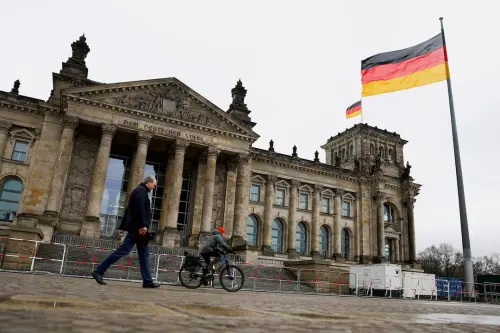Berlin, Feb 17 (Reuters) - Germany is set to hold a snap national election on Feb. 23 following Chancellor Olaf Scholz's formation of a three-way coalition.
The main contenders are the centrist "big-tent" parties in Germany: Scholz's center-left Social Democrats (SPD) and the opposition conservatives, a union of the Christian Democrats (CDU) and their Bavarian counterpart, the Christian Social Union (CSU).
In recent years, both major parties have seen a decline in support, while smaller parties such as the Greens and the far-right Alternative for Germany (AfD) have gained traction.
All major parties - SPD, conservatives, Greens, and AfD - are presenting candidates for chancellor. Additionally, the Free Democrats (FDP), the far-left Linke, and the leftist Sahra Wagenknecht Alliance (BSW) are also running, but face the risk of falling below the 5% threshold required to enter parliament.
Polls indicate that the conservatives have been leading for over two years, standing at 30%, with the AfD following at 20%. The SPD has dropped to third place with 16%, trailed by the Greens at 13% and Linke at 7%. The FDP is polling at 5% and the BSW at 4%.
Regarding key issues:
- Ukraine When it comes to Ukraine, Germany’s mainstream parties support aiding the country against Russia, while the AfD and BSW advocate for stopping weapons shipments to Kyiv and a return to amicable ties with Moscow. Chancellor Scholz and the SPD lean towards diplomacy whereas the conservatives, Greens, and FDP favor supplying long-range Taurus missiles to Ukraine.
- Reviving the economy The German economy's 2024 outlook remains concerning, with high energy prices posing challenges. Approaches to combat this differ among parties, with the CDU, SPD, and Greens aligning on expanding renewable energy. The CDU and AfD consider exploring a return to nuclear power; a notion rejected by the SPD and Greens. Scholz proposes incentivizing private investment and modernizing infrastructure with a 100-billion-euro off-budget fund while suggesting a 10% tax deduction on business equipment investments.
- Migration Rising concerns over security and migration, fueled by violent incidents involving foreign individuals, have led to calls for stricter migration policies from political parties. The CDU has toughened its stance, advocating for asylum seekers to be turned away at the borders and restricting family reunifications and refugee naturalizations. In contrast, the Greens endorse a more open asylum policy, supporting state-sponsored sea rescue operations and facilitating family reunifications and integration.
